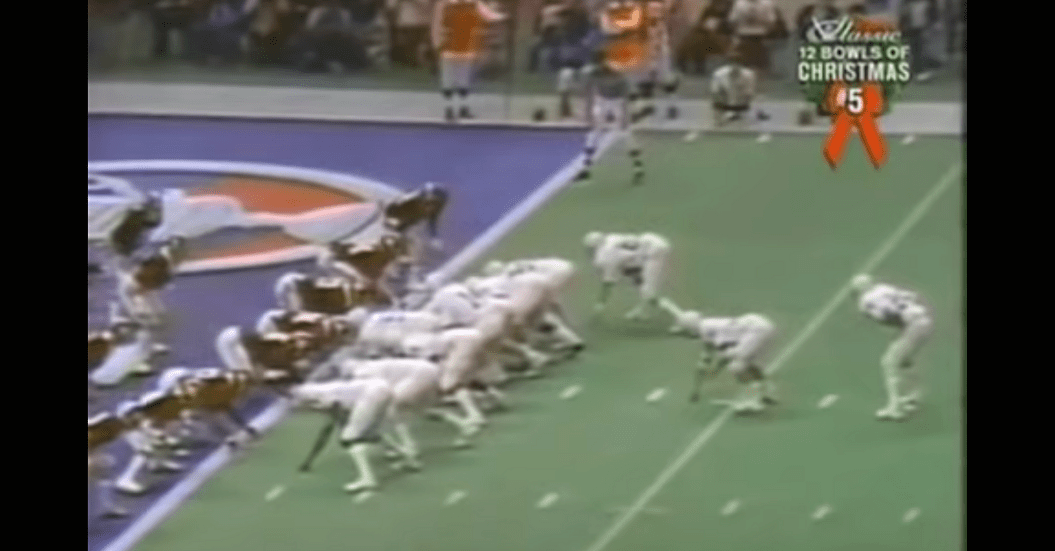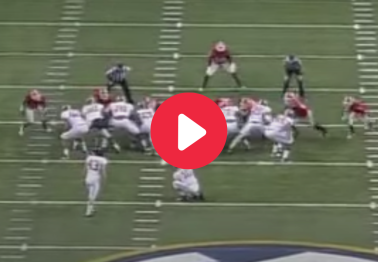Modern college football is all about offense. Any game that doesn't feature at least 40 combined points is getting dubbed a "snoozer" by just about everyone, but that wasn't always the case. Before the days of 65-touchdown seasons and 819-yard performances, one adage meant everything: defense wins championships.
Unless you're the Oklahoma Sooners, you understand that simply fielding a competent defense is critical to winning. That being said, football of the past revolved around elite defenses and just-good-enough offenses. I'll direct you to the 1979 Sugar Bowl game for proof.
1979 Sugar Bowl: Alabama vs. Penn State
Great moment in @AlabamaFTBL history:
Alabama 14, Penn State 7 ? 1979
Alabama tore through eight straight opponents on its way to a No. 2 ranking and a bid to the 1979 Sugar Bowl against the No. 1-ranked Penn State Nittany Lions.#SECFB x #CFB150 » https://t.co/VW7DehGOcl pic.twitter.com/tDB264RuLZ
— Southeastern Conference (@SEC) September 30, 2019
At the end of the 1977 season, Bear Bryant's Alabama Crimson Tide were ranked No. 3 in the nation. They smoked Ohio State in the '78 Sugar Bowl, 35-6, and saw the top two teams lose that same day. However, the fifth-ranked Notre Dame Fighting Irish had beaten No. 1 Texas, then jumped Alabama to claim the national title.
Bryant and company were out for revenge the following season, feeling they were robbed.
The Tide survived a ruthless non-conference schedule that included Nebraska, Missouri, and a road victory over defending Rose Bowl champion Washington. They clinched a 10-win season by beating Auburn in the Iron Bowl, and their only loss came against then-No. 7 USC at Legion Field in Birmingham.
That resume brought Alabama face-to-face with the top-ranked Penn State Nittany Lions. Head coach Joe Paterno boasted the No. 1 defense in America, an offense led by Maxwell Award-winning quarterback Chuck Fusina, and a program riding a 19-game winning streak.
It was No. 1 versus No. 2 with the national championship up for grabs.
Oh, and Alabama's famous Big Al mascot made his debut at the Louisiana Superdome.
Fun fact: @Official_Big_Al debuted at the 1979 Sugar Bowl ??? #RollTide pic.twitter.com/kqsvIJnkaQ
— The Univ. of Alabama (@UofAlabama) January 3, 2018
RELATED: Why Is Alabama's Mascot an Elephant Named Big Al?
Two stalwart defenses lived up to the billing. Alabama's wishbone offense scored late in the second quarter when Alabama quarterback Jeff Rutledge found Bruce Bolton to take a 7-0 lead. Penn State's first score came after a third-quarter interception put them in Crimson Tide territory — Wide receiver Scott Fitzkee caught a touchdown pass to even the score.
Set up by Lou Ikner's 62-yard punt return, Alabama running back Major Ogilvie took a pitch and scored the go-ahead touchdown late in the third. Alabama's 14-7 lead was slim heading into the fourth quarter, but that was all the offense they'd need before one of the greatest sequences in team history.
"The Goal-Line Stand"
A fumble deep in Alabama territory gave Penn State the football with a chance to tie the game. However, it was Alabama's defense, namely linebacker Barry Krauss, who stood tall when it mattered most.
1st-and-Goal: PSU's Matt Suhey runs for two yards.
2nd-and-Goal: PSU's Scott Fitzkee catches pass for five yards to the 1-yard line.
3rd-and-Goal: Suhey gets stuffed by Curtis McGriff and Rich Wingo.
4th-and-Goal: PSU fullback Mike Guman leaps, but Barry Krauss stops him short of the end zone.
With six minutes still to play, Alabama ran off a huge chunk of the clock, giving Penn State almost no time to mount a final comeback.
Alabama 14, Penn State 7.
For his heroics, Barry Krauss was named Most Valuable Player of the 1979 Sugar Bowl — He was the only defensive player in game's first 75 years to win the MVP award until Georgia's Marcus Howard in the 2008 Sugar Bowl.
Most importantly, that football game solidified Alabama football's place on college football's mountaintop with the program's fifth national championship under Paul "Bear" Bryant. In case there was any doubt, the Crimson Tide went 12-0 the following year and were dubbed back-to-back champs.
Great moments aren't hard to find in Alabama history. The famous goal line stand to win the Sugar Bowl in New Orleans ranks among the very best.

